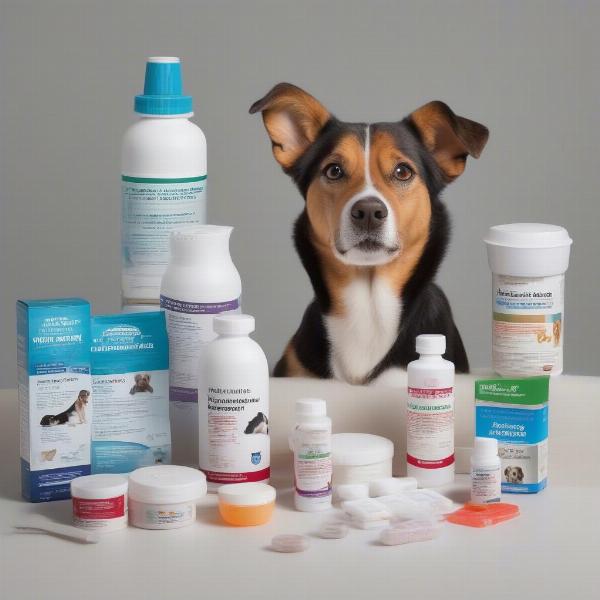Parasites in dogs are a common concern for owners worldwide. Understanding what kills parasites in dogs is crucial for protecting your furry friend’s health and well-being. This article will delve into effective parasite control methods, exploring various treatments and preventative measures to keep your dog parasite-free.
Understanding Different Types of Dog Parasites
Before we discuss what kills parasites in dogs, it’s important to know the common culprits. External parasites like fleas and ticks can cause itching, skin irritation, and even transmit diseases. Internal parasites, such as worms (roundworms, tapeworms, hookworms, whipworms) and heartworms, can lead to more serious health issues like organ damage and even death.
Effective Treatments for Dog Parasites
Several effective treatments can eliminate parasites in dogs. These include:
- Topical Treatments: Spot-on treatments are applied directly to the dog’s skin, usually on the back of the neck. These are commonly used for fleas and ticks. dog and cat flea treatment offer a convenient way to administer medication.
- Oral Medications: These can be in the form of tablets or chewables, effective against both internal and external parasites. Some oral medications provide broad-spectrum protection, targeting multiple parasite types. nexgard large dog is one example of such medication.
- Injections: Certain parasites, like heartworms, require injectable medications administered by a veterinarian. These injections are highly effective in eliminating the parasites and preventing reinfection.
- Shampoos and Dips: Medicated shampoos and dips can kill existing parasites and provide temporary protection against reinfestation. These are particularly useful for treating flea and tick infestations.
- Collars: Medicated collars release insecticide over time, providing continuous protection against fleas and ticks.
 Various parasite treatments for dogs: topical, oral, collars.
Various parasite treatments for dogs: topical, oral, collars.
Preventing Parasite Infestations in Dogs
Prevention is key to maintaining your dog’s health. Here are some preventive measures:
- Regular Vet Check-ups: Regular veterinary examinations are crucial for early detection and treatment of parasites.
- Year-Round Parasite Prevention: Don’t wait for an infestation to start treatment. Use year-round preventative medications recommended by your vet.
- Environmental Control: Maintaining a clean environment can help minimize parasite exposure. Regularly clean your dog’s bedding and vacuum your home to remove fleas and eggs.
- Grooming: Regular grooming can help you spot parasites early on. dog grooming training bristol can be a helpful resource if you’re in the area.
- Lawn Care: Keeping your lawn trimmed and free of debris can help reduce tick populations.
What are the signs my dog has parasites?
Signs of parasites can vary depending on the type of parasite. Common signs include excessive scratching, skin irritation, vomiting, diarrhea, weight loss, and lethargy.
How often should I treat my dog for parasites?
The frequency of treatment depends on the specific product and your dog’s individual needs. Always follow your veterinarian’s recommendations. bob martin clear flea and tick spot on for dogs is a popular option for regular flea and tick control.
Conclusion
Protecting your dog from parasites is an essential part of responsible pet ownership. Understanding what kills parasites in dogs and implementing effective preventative measures will ensure your furry companion stays healthy and happy. Remember to consult with your veterinarian for personalized advice and the best treatment plan for your dog.
1. Are all parasite treatments safe for puppies?
No, not all treatments are safe for puppies. Consult your veterinarian for appropriate medications for young dogs.
2. Can I use over-the-counter parasite treatments?
While some over-the-counter treatments can be effective, it’s always best to consult your vet for personalized recommendations.
3. How can I prevent my dog from getting heartworms?
Year-round preventative medication prescribed by your veterinarian is the most effective way to prevent heartworm disease.
4. What should I do if my dog has a severe flea infestation?
Consult your veterinarian immediately. They can recommend the most appropriate treatment plan.
5. Are natural remedies effective against parasites?
While some natural remedies may offer some repellent properties, their effectiveness in eliminating established infestations is often limited. Consult your veterinarian before using any natural remedies.
ILM Dog is a leading international online resource dedicated to providing dog owners with expert advice and information on all aspects of dog care. We cover everything from breed selection and health care to training, nutrition, and grooming. From puppy care to senior dog needs, we’re your one-stop shop for expert guidance. Whether you’re a seasoned dog owner or just starting your journey, ILM Dog offers a wealth of knowledge to support you. Contact us at [email protected] or +44 20-3965-8624 for personalized advice. Visit ILM Dog for more valuable resources.